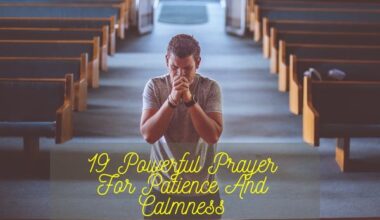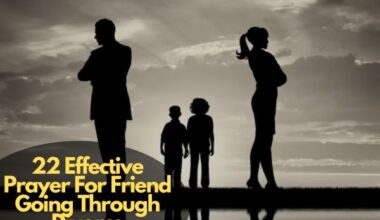In the hustle and bustle of contemporary life, finding solace in prayer can be challenging. The question, “Why Is It Hard To Pray?” beckons us to explore the multifaceted barriers that often hinder our spiritual connection. This article is not merely a discourse on challenges; it’s a guiding light for those navigating the intricate path of prayer.
Why Is It Hard To Pray
Prayer. A simple word, yet it can evoke complex emotions and experiences. For some, it’s a source of deep comfort and connection, a whispered conversation with the divine that brings solace and guidance. For others, however, prayer can be a struggle, a silent battle against doubt, distraction, and a sense of unworthiness.
Why is it so hard for some to pray? The reasons are as varied as the stars in the sky. Some grapple with internal roadblocks like a lack of clarity in their intentions, anxieties that cloud their focus, or even the gnawing feeling of not being “good enough” to be heard. Others face external challenges like the constant din of our modern world, negative past experiences with prayer, or even societal pressures that make open conversations with the divine feel taboo.
The difficulty of prayer is a common experience shared by many, regardless of their faith or personal circumstances. There are a variety of reasons why prayer can feel challenging, some of which include:
Internal factors
- Lack of clarity: Sometimes, we struggle to articulate our thoughts and feelings, making it hard to express ourselves clearly in prayer.
- Doubt and uncertainty: Doubts about the effectiveness of prayer or even the existence of a higher power can make it difficult to engage in the practice with full conviction.
- Emotional barriers: Feelings like anger, resentment, or apathy can create an emotional block that hinders our ability to connect with something beyond ourselves.
- Distractions: Our fast-paced lives and busy minds can make it hard to find the time and focus necessary for meaningful prayer.
External factors
- Cultural pressures: Societal views on prayer can be conflicting, with some people feeling judged or embarrassed to engage in the practice openly.
- Negative experiences: Past experiences with unanswered prayers or disappointment in religious institutions can create negative associations with prayer that are hard to overcome.
- Misconceptions about prayer: Sometimes, we hold erroneous beliefs about what prayer “should” be like leading to feelings of inadequacy or failure when our experience doesn’t match the expectations.
It’s important to remember that there is no right or wrong way to pray. Prayer is a personal and intimate conversation with whatever you perceive as your higher power. It can be expressed in words, emotions, silence, or even actions.
Here are some tips that might help you overcome the challenges of prayer
- Start small: Don’t force yourself into long, elaborate prayers. Begin with a few simple words of gratitude or a brief expression of your concerns.
- Find a quiet space: Create a dedicated space where you can feel comfortable and focused when you pray.
- Practice regularly: Like any skill, prayer requires practice. Aim for consistency rather than perfection, and even short moments of prayer throughout the day can be meaningful.
- Be open-minded: There is no single “correct” way to pray. Experiment with different methods and find what works best for you.
- Be patient: Don’t expect immediate results or dramatic changes. Prayer is a journey, not a destination.
- Seek support: Talking to a trusted spiritual advisor or religious leader can offer guidance and encouragement as you develop your prayer life.
Conclusion
As we reach the culmination of our exploration into “Why Is It Hard To Pray,” it becomes evident that the challenges posed by modern life and personal doubts are not insurmountable obstacles but stepping stones toward spiritual growth.
This article has sought to empower readers with insights, strategies, and a sense of understanding, allowing them to navigate the hurdles on their journey to a more enriching prayer experience. Embrace the difficulties, cultivate resilience, and let this be a testament to the transformative power of perseverance on the path to spiritual fulfilment. May your prayer journey be not just a routine but a significant and rewarding connection with the divine.
Frequently Asked Questions
Is it normal to find prayer challenging?
Finding prayer challenging is a common experience. Factors such as distractions and doubts can contribute. Acknowledging these challenges is the first step towards overcoming them.
How can I create a conducive environment for prayer?
Designate a quiet space, free from distractions, and establish a routine. Consistency and a dedicated environment can significantly enhance the prayer experience.
What if I don’t feel a connection during prayer?
Feeling disconnected at times is normal. Focus on the intention behind your prayers, and explore different forms of spiritual expression to deepen your connection over time.




